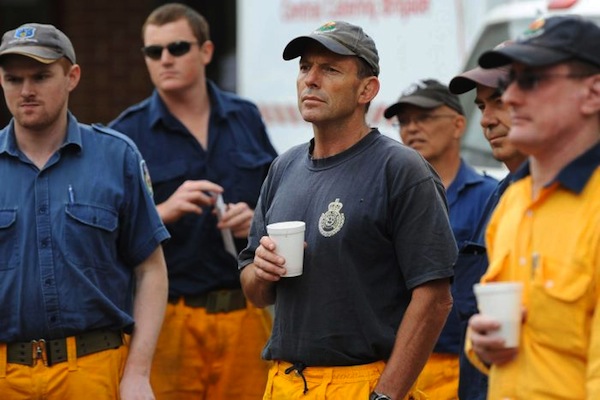Tony Abbott’s denial of a link between wildfires and climate change undermines preparation for future fire emergencies. [29 October 2013 | Peter Boyer]

Tony Abbott at a bushfire briefing. PHOTO Greg Wood/AFP
Tony Abbott has done a fair bit around bushfires. As a volunteer on a rural fire brigade based at Davidson in a fire-prone part of Sydney’s north, he’s been out there on the front line every spring and summer for 13 years.
He’s been specially trained for driving tankers and operating chainsaws and breathing apparatus, and has earned the respect of others on his crew. If I was in a pickle in a bushfire, I’d be happy to have him close at hand.
All of this would suggest he’s well-equipped to respond to a United Nations official’s comment last week that the NSW fires were part of the “price of carbon” — the cost we are paying for disturbing the global water cycle through global warming.
When Melbourne radio talkback host Neil Mitchell mentioned the remarks by Christiana Figueres, who manages the UN Framework Convention on Climate Change, Abbott’s immediate response was that she was “talking through her hat”. Fire, he said, was part of the Australian experience and always had been. “Climate change is real, and we should take strong action against it. But these fires are certainly not a function of climate change; they’re just a function of life in Australia.”
Figueres, daughter of a former president of Costa Rica, was an anthropologist specialising in sustainable food production before entering government service. She has specialised in climate policy in international forums since 1995, and took over the running of the UNFCCC in 2010. Her UNFCCC career is based on the science of climate change, and her statements accord with the finding of that science that human carbon emissions, by causing global warming and disrupting the water cycle, have led to conditions favouring wildfire.
Tony Abbott doesn’t dwell too much on such things. Apart from the odd disparaging remark, throughout his political career he has chosen to avoid discussing the science of global warming. He’s a practical man, and bases his views about climate on his personal experience.
Indeed, Australia’s experience of highly dangerous wildfires isn’t new. The Sydney region has its fire season earlier than southern states, and has had damaging fires in October before, which would seem to support the Abbott line that this year is nothing out of the ordinary.
In the absence of strong data to the contrary, the Abbott thesis on bushfires can be made to appear convincing, coming as it did from a bloke who had just done an arduous stint on the front line. But as a Davidson brigade fireman, Tony has a boss, and this boss has a rather different take on things.
NSW Rural Fire Services Commissioner, Shane Fitzsimmons, asked about the place of the 2013 fires in the state’s wildfire history, said that “never before have we seen the extent of damage and destruction and wide-scale fire activity at this time of the year.”
His predecessor, Phil Koperberg, who led the NSW Rural Fire Services when Abbott first joined up, was more explicit. These fires were exceptional, he said, in the intensity of fire so early in the season and the “enormous” impact on property and the natural environment. “That’s the climate in which we live and that’s the changing nature of both frequency and ferocity of fires which we are going to have to deal with in the future.”
Of course a changing climate doesn’t ignite wildfires. No-one’s saying it does. But when a fire season, the period each year when the bush is dry and prone to wildfire, is extended by a month or two at either end, we have a problem, and it’s a climate-related problem.
And that’s just what’s happening. As the fire chiefs said, Sydney’s past October fires were never like this. The speed and devastation of this one is something we’ve come to associate with the dry heat and fierce winds that are part of summers in more southerly states.
Yet by week’s end Abbott was boldly declaring that that linking climate to the NSW fires was “complete hogwash”, posing the old furphy that a broken weather record doesn’t prove climate change. Of course it doesn’t, which is why science focuses on trends and multiple records.
Abbott’s environment minister, Greg Hunt, struggled to reconcile the irreconcilable. Of course the prime minister accepted the science behind climate change, he told a BBC interviewer. “We have taken the science off the table. We accept it. We’re not debating it.”
David Bowman is a scientist, and he’s concerned at what he hears. As professor of environmental change biology at the University of Tasmania, he anticipates that more extreme fire weather, which he believes is inevitable, will mean big changes in how we live in our flammable landscapes.
Bowman says our governments should be planning now for clearing buffer zones, improving fire management and making homes more fire-resistant, which will require big money and many years of planning. He’s alarmed by the certainty in Abbott’s statements.
Hunt and his leader need to get their stories straight. Here’s a start: they could sit down together and contemplate the list of devastating bushfire events that Abbott reeled off to Neil Mitchell to show that Australia has always been a fire-prone continent.
The dates Abbott provided were the 1850s, 1939, 1968, 1983, 1994, 2001 and 2009. He missed the odd big one, but these were what came to his mind. Check the intervals between them, and the gap from 2009 to this year’s Tasmanian and NSW fires. Does that tell you something?
THE Social Determinants of Health Advocacy Network is honouring the memory of Gavin Mooney and Del Weston in a two-day forum, “Our health – who decides?”, starting November 27 at Venue C3, 64 Angelsea Street, South Hobart — see www.sdohan.blogspot.com.au or call 0400480908.
